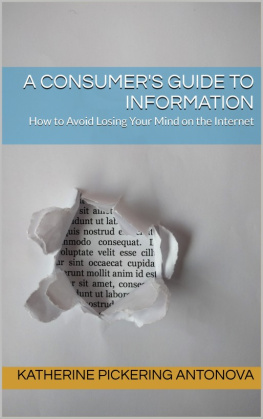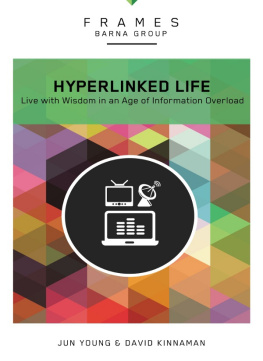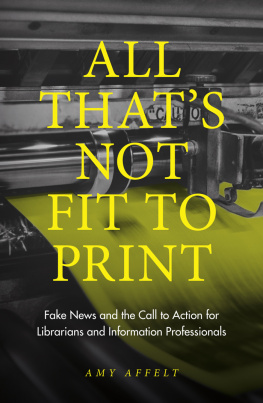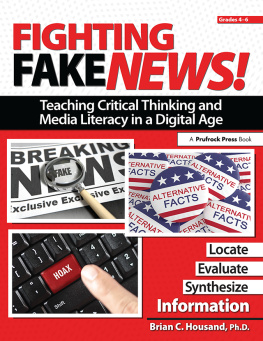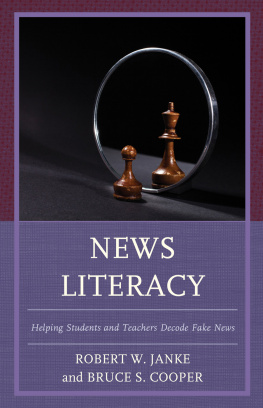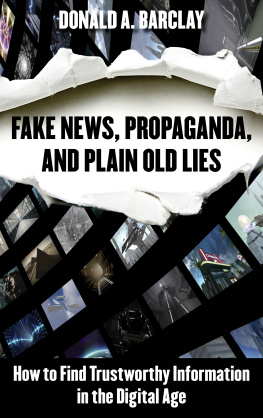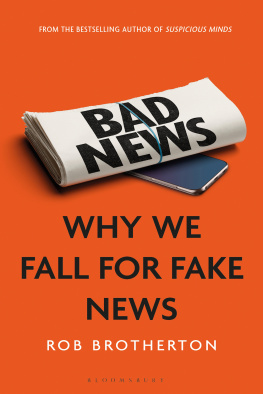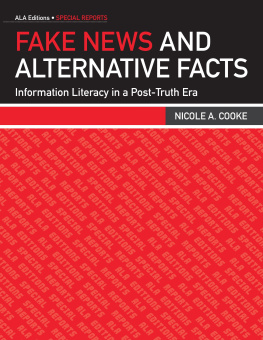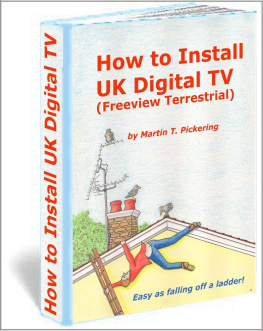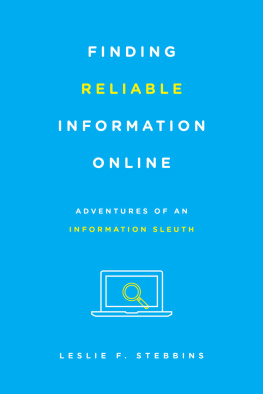A Consumer's Guide to Information
How to Avoid Losing Your Mind on the Internet
Katherine Pickering Antonova
Copyright 2016 Katherine M. Antonova
All Rights Reserved
This ebook is licensed for your personal use andenjoyment only. This ebook may not be resold or given away to otherpeople. If you would like to share this book with another person,please purchase an additional copy for each recipient. If yourereading this book and did not purchase it, or it was not purchasedfor your use only, then please return to your favorite ebookretailer and purchase your own copy. Thank you for respecting thehard work of this author.
This is for Anya and Marina: in the hope that yourgeneration handles information better than your elders have.
Contents
?
CHAPTER ONE
INFORMATIONREVOLUTION
In the early stages of the industrialrevolution, people reported being terrified or nauseated by thespeed of the new trains, and changes in work and the environmentmassively altered most peoples lives, often in ways that weredeeply damaging. Today we are living in the early stages of aninformation revolution that is similarly transforming most aspectsof our lives, and it can be overwhelming.
This Is Hard forEverybody
We have easy access to enormous amounts ofinformation, but it has also become harder to escape thebombardment. While it should be easier than ever to find out whatwe need to know, in some ways this too has actually become harder,because there is so much unhelpful information to sort throughfirst.
Moreover, our own brains are fighting us. Weare not built to manage information at the speeds we now confront.The constant distraction caused by alerts and alarms emanating fromour personal devices makes it difficult to focus. Staring atlighted screens after dark disrupts our sleep. And more deeply,various defense mechanisms that humans have developed to cope withrisk and threats in the physical world can actually make us morevulnerable in the digital world, where we get the wronginformation, miss what we do need, and get manipulated or cheatedby those who use our vulnerability for their gain.
The onslaught of information we face everywaking minute of the day is not just hard on our minds and bodiesand a source of vulnerability. Too much information often justmakes us feel bad. We are exposed to a great deal of sad ordifficult news even when it doesnt affect us. We are pressured tomake decisions without being able to master whats at stake inthem. We know so much about each other that we are often battlingfeelings of jealousy, hurt, fear, and worry about how we stand inrelation to others, what they think of us, and how different manyof us really are, even while most people actually get along justfine with others in face-to-face encounters.
It is tempting to just turn away from thisupsetting wall of noise. However, the interconnectedness of ourworld through information is now so dense that total avoidance isimpossible. This book offers basic critical thinking strategies tohelp anyone navigate the minefield of non-stop information. If wewere all a little better at handling the situation, the situationwould improve for everyone.
How to Use This Book
This book is for anyone who feels overwhelmedby information in general or stressed by the difficulty of findingwhat we need and can rely on, in particular. These days that mightwell be all of us.
Casual readers who are looking to improvetheir approach to information in certain realms should feel free tojump around: the sub-headings in each chapter are meant to make thebook easy to navigate.
Those who are just beginning to think abouthow they consume information should find plenty to ponder by simplyreading through from beginning to end.
Those who want to do serious work on becominga savvy citizen in the world of digital information are recommendedto skim the book first for an overview, and then move slowlysection by section, trying out the ideas here one at a time, withfrequent breaks.
Improving our information literacy is hardwork that takes time, but like most skills it gets faster and moreautomatic with practice, and comes with a big payoff. In this case,the payoff will be getting reliable answers to our questions,knowing how to avoid being manipulated or conned, and having theconfidence of being able to defend our views and the security ofknowing we are acting on solid information.
What Is CriticalThinking?
Critical thinking is not a negative approachto the world. Critical thinking is a rational process of sortingand weighing information so that we can find what we need and haveconfidence in what we know. It is a way of training our brains toovercome those instincts that work against us in the world ofinformation. It is also a way of seeing the world beyond ourpersonal perspective. It shows us how our actions affect others wehavent met. This teaches us how to act with compassion andfairness not just toward the people we meet face-to-face, buttoward all those whose lives we touch.
Can You Handle theTruth?
Critical thinking is an active, effortfulpractice. Especially at the beginning, if it hurts it means youredoing it right, much like a physical workout. We have to trainourselves to work past our first reactions, because these reactionstend to be not just emotional, but specifically grounded in thefeelings of our lizard brain, where fear, disgust, panic andother extreme reactions are triggered before we have a fullunderstanding of our situation.
Even people who have many years of trainingand experience in research fields still need to constantly remindthemselves to question their own biases and go through mentalchecklists, though other parts of the critical thinking processbecome second nature with time.
Paying Attention
Critical thinking is also more than a set ofskills that we can practice. It requires a degree of mindfulattention that is more difficult to find time for now than ever.Think of mindful attention as the kind of zone an artist or athletegets into at their best.
For example, ordinarily when we look atsomeones face, our brains rush to recognize the person and readtheir expression, because thats what we need to do most of thetime. But we can make a conscious effort to look at that face in acompletely different way, as an artist does, seeing details wenormally gloss over like the fact that the face takes up the bottompart of the head only, or the way shadows contour the features.
This willful act of shifting focus andnoticing what you didnt see on first glance is also central tocritical thinking.
Engaging with Ideas
To engage with ideas means to try them out,understand them, and walk around with them awhile without judgingthem. Judging may follow, but the only way to truly disagree withan idea to do so with certainty, in a way you can defend toothers is to first fully understand it from the perspective ofthose who hold the idea. You have to temporarily let your owncertainties, expectations, and experiences be set aside in order totake in another view of the world. Then you return to your own,hopefully having been enriched by your journey.
This is not a comfortable process. If youredoing it right, it should fill you with doubt, and maybe evenguilt, shame, fear, and anger. This is because you need toseriously entertain a reality where what you think you know is not,in fact, true. That is an upsetting sensation. When youre donewith this process you might come back to where you began, or youmight come back somewhere nearly where you began, or perhaps youllland somewhere unexpected. You cant know, or the process wontwork.
Entertaining real uncertainty and doubt isincredibly difficult. It is a leap of faith, where you unmooryourself from much of what you know and therefore from much of

